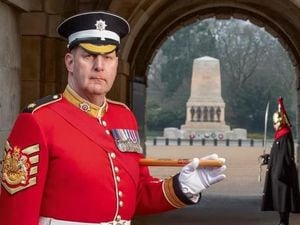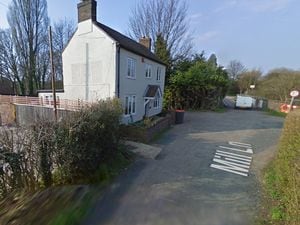Actor Ricky Tomlinson seeks Shrewsbury jury members in bid to clear his name
Actor Ricky Tomlinson today appealed for one of the jurors who sat on his trial at Shrewsbury Crown Court in 1973 to get in touch, saying they might have crucial information which could help clear his name.
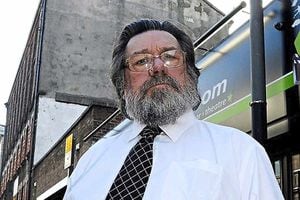
The former Brookside and The Royle Family star, who was working as a plasterer at the time, was one of three men jailed for conspiring to intimidate workers at building sites in Shrewsbury and Telford during a bitter strike in September 1972.
Mr Tomlinson, who served 15 months of a two-year jail sentence, has always protested his innocence and is seeking to clear his name and that of his co-defendants, including Des Warren, who got the longest sentence of three years.
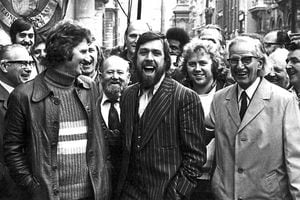
Mr Warren died in 2004 from Parkinson's disease, alleged to have been caused by a drug known as "liquid cosh" to restrain prisoners.
Mr Tomlinson said that when sentence was passed by judge Sir Hugh Mais in December 1973, two members of the jury jumped out of their seats and remonstrated with the other jurors.
"The two then stormed out of the courtroom and went into the jury room," he said.
One of the men was identified as Norman Walton, and his family have since come forward with information of how the jury were assured he would not go to jail in the event of a guilty verdict, the actor said.
"I would like to hear from any other jury member or their families to discuss what was said in the jury room," he said.
"I bear them no ill-will as they were used in this conspiracy as we were. The case is now over 40 years old and yet the Government is refusing to release relevant documents, it is withholding the documents under the security blanket in the interest of national security."
He added he was planning to visit Shrewsbury soon with documents that he says provide evidence that the prosecutions were politically motivated.
Anybody who sat on the jury can email rita@rickytomlinson.com
It may have been 43 years ago – but for Mr Tomlinson, the sense of bitterness and perceived injustice is palpable.
"I'm a 77-year-old building worker, and an actor by trade, but I'm classed as a threat to national security. I'm classed the same as Abu Hamza," he bristles.
For those unfamiliar with the case of the Shrewsbury Two, of which Mr Tomlinson is the sole surviving member, the idea that the star of Brookside, The Royle Family and Mike Bassett: England manager might be viewed as a threat to the safety of the nation seems absurd.
But before finding fame through his TV work, Mr Tomlinson hit the headlines for a very different reason.
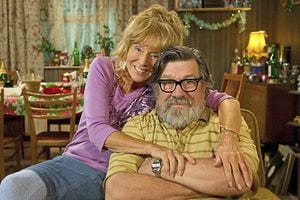
In December, 1973, along with five other men, he stood in the dock of Shrewsbury Crown Court, waiting to hear his fate. They had all been accused of conspiracy to intimidate workmen on building sites around Shrewsbury and Telford, and were further charged with unlawful assembly and affray.
The news wasn't good. He and Des Warren, identified by the prosecution as the ring leaders, were found guilty of all three charges, and were jailed for two and three years respectively. John McKinsie Jones was also found guilty of all three offences, and received a nine-month sentence. The three others received non-custodial sentences after being cleared of conspiracy and affray, but convicted of a lesser charge of unlawful assembly.
As judge Sir Hugh Mais passed sentence, two members of the jury got up out of their seats to remonstrate with their fellow jurors, before storming out of the courtroom. The actor now believes they could be crucial to clearing his name.
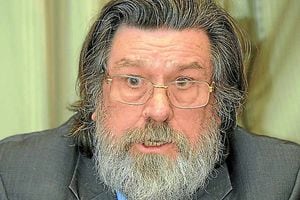
Four years ago, more than 2,000 people signed a petition organised by the actor calling for the publication of Government documents relating to the case, with high-profile supporters including shadow chancellor John McDonnell and Labour deputy leader Tom Watson.
The charges related to a series of protests that took place on September 6, 1972. A group of about 250 pickets from Oswestry, Wrexham, Chester, Market Drayton and Colwyn Bay travelled first to the Swiss Farm construction site at Copthorne, Shrewsbury, where the strikers claimed to have been threatened with a shotgun by a workman.
Later that day, they called at four sites in Telford, including the Brookside and Woodside housing estates which were under construction.
At the time, the Shropshire Star reported at Brookside "they marched three or four abreast across the site, some brandishing sticks and bars. Bricks were thrown at men on scaffolding and windows, and machinery smashed. Two men were hurt".
Mr Tomlinson tells a very different story. He points out that no arrests were made on the day, and insists that a police chief had thanked him keeping the situation under control.
The events in Shropshire took place during the first and only builders' strike, which lasted for 12 weeks, and helped secure a significant pay rise for the workers. But then, as today, many building workers were self-employed sub-contractors – "lumpers" – who were paid by the job, did not enjoy paid holiday or sick pay, and weren't union members.
Mr Tomlinson says that on the day his trial was due to start, the six men were placed in a "holding cell" a communal area where defendants would sit while they waited to be called.
"Before the trial was due to start, the prosecution offered us a deal that if we pleaded guilty, they would give us all a £50 fine, and that would be paid by the union," he says. "They said that way we would all be home by midday.
"The other four lads took the deal, but I had never been in any trouble with the police before, and neither had Dessie, and we said there was no way we would be pleading guilty to something we hadn't done. The other lads saw that we were doing that, and decided they would do the same.
"The trial lasted 55 days, and in today's terms it cost the equivalent of between £12 and £15 million."
He now believes the two dissenting jurors could be crucial to getting the convictions overturned.
One of them was Norman Walton, whose family have now come forward with what Mr Tomlinson believes could be vital evidence.
"I would like to hear from any other jury member or their families to discuss what was said in the jury room," he says. "I bear them no ill-will as they were used in this conspiracy as we were."
Mr Tomlinson's trial was the first of three which saw a total of 24 men convicted of offences relating to events in Shrewsbury and Telford.
"The police came one night as my wife was bathing the two lads in front of the fire," he says. "I was whizzed off to the local police station and because I had never been in trouble with the police I had no experience of anything like this, I was appalled.
"We were taken in a van to Shrewsbury with police in front and behind, police cars with Alsatian dogs and motorbike out-riders. Got to the police station in Shrewsbury, we were fingerprinted, photographed, it was surreal, absolutely surreal and to find out I had 21 charges against me for doing everything bar robbing the crown jewels, it was ludicrous."
The defence in the case called for the trial to be held in a neutral location, arguing that they may not get a fair trial. But Judge Mais ruled the case had to be heard in Shrewsbury.
During their time in prison, Mr Tomlinson and Mr Warren took part in regular hunger strikes, and from December 1974 onwards they wore only towels as clothing.
It later emerged that Mr Warren had been administered a sedative known as "liquid cosh" during his time in prison, and he died aged 66 in 2004 from "chemically induced Parkinson's disease." Before his death, Mr Warren accepted an out-of-court payment from the prison authorities after he began legal action.
Forty-three years on, Mr Tomlinson is a freeman of his home city of Liverpool and has enjoyed a successful acting caree. But it seems to be the death of Mr Warren that leaves him unable to give up his fight.
An appeal has been lodged with the Criminal Cases Review Commission and the fight goes on. The case will claim that Ted Heath's Conservative Government of the early 1970s interfered with the judicial process by encouraging the prosecutions to deter secondary picketing, which was then a common practice before being outlawed in the 1980s. Mr Tomlinson says he will be organising a rally in Shrewsbury shortly, where he will reveal several "top-secret" papers he has managed to obtain that provide evidence of a conspiracy from the highest levels of Government.
He recalls visiting Mr Warren at his flat in Chester shortly before his death.
"I promised him I would carry on," he says. "We were innocent then and we're innocent now."

